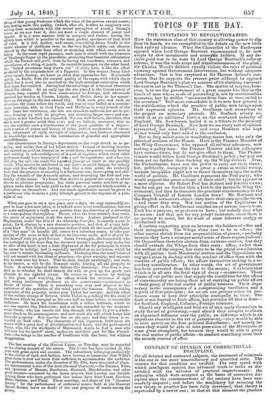TOPICS OF THE DAY.
THE INVITATION TO REVOLUTIONARIES.
How the statesman class of this country is allowing power to slip from its hands, we see exemplified in the debate on the new little Irish railway advance. What the Chancellor of the Exchequer opposed when Lord George Bentinck recommended it, he now adopts by slow instalments and miserable driblets. If any de- cisive good was to be done by Lord George Bentinck's railway scheme, it was the wide scope and simultaneousness of the plan : Sir Charles Wood's driblets equally violate the rules of political economy against Government intervention, but without adequate advantage. One is less surprised at Sir Thomas Acland's con- fession that he supports the present grant although he opposed Lord George Bentinck's plan on account of its alarming vastness: the vast is not in Sir Thomas's line. The matter of surprise, how- ever, is to see the government of a great empire like this in the hands of men whose mode of proceeding is, not by statesmanlike measures, but by driblet "measures from time to time suited to the occasion." Still more remarkable is it to note how general is the stultification which the practice of public men brings upon their expressed opinions. Mr. Goulburn took exceptions to the project on monetary grounds. Mr. Roebuck utterly re- sisted it as an additional burden on the overtaxed industry of England. Mr. Newdegate hailed it as a tribute to the memory of Lord George Bentinck. Now here we see every sort of opinion represented, but none fulfilled ; and some Members who kept silence would only have added to the confusion. But to drop minor men in wandering mazes lost, take only the principal sections of the House. Here is the Finance Minister of the Whig Government, who opposed all railway advances, now making a paltry loan : the Finance Minister and his colleagues have certain views, but do not give effect to them. The Protec- tionists would follow Lord George Bentinck's policy ; but you see them get no further than backing up the Whig driblets. True, the Protectionists have not the power to carry out their views ; but, politically, incapacity is as great a crime as wilful wrong, because incapables ought not to thrust themselves into the active world of politics. Mr. Goulburn represents the Peel party, who would support the great scheme of their chief ; but he appears as a mere objector. Sir Robert Peel has distinct and forcible views ; but he can get no further than a hint to the incapable Whig Go- vernment, and then he transfers the practical statesmanship to the Common Council of famous London town! Mr. Roebuck and the English economists object: they have their own specific views, —and there they stop. Not one section of the Legislature is giving effect to its intellectual conclusions or serious convictions. Each has a purpose, or professes to have ; but nobody does what he means : and that not for any potent resistance, since there is no potency to resist, but for want of some inherent energy or determined will.
A curious coquetting goes on between the holders of office and their antagonists. The Whigs alone care to be in office ; the other parties shrink from the responsibilities of power,—probably because they have a stronger moral sense of those responsibilities : the Oppositions therefore abstain from extreme courses, lest they should extrude the Whigs from their seats: office, rather than the welfare of the empire, has come to be the grand consideration with all parties : both Ministerial section and the Oppositions are engaged more in dealing with the conduct of office than with the conduct of public affairs; the affairs themselves sinking to a se- condary consideration. In other words, the art of government has been perverted from the end to the means ; it exhibits that which is in all arts the fatal sign of decay—mannerism. Those classes of our public men that supply the candidates for the offices of statesmanship are losing their art of carrying on public affairs —their grasp of the real matter of public business. Their dege- neracy is the consequence of a compromising vacillation and a neglect of first principles ; for no art can prosper when its pro- fessors cease to keep first principles constantly in view. The fault is not limited to Irish affairs, but pervades all that is done— for Scotland, England, Colonies Foreign relations.
Should any intelligent and bold set of men apply themselves to study the art of governing,—and should they conspire to obtain an organized influence over the public, an influence which is an important element in the art of government,—they would be able to seize power on the first political disturbance; not merely be- cause they would be able to take possession of the Metropolis or some great stronghold, but because they would be able to grasp the real matter of public affairs—to conduct something more than the smooth routine of office.


























 Previous page
Previous page